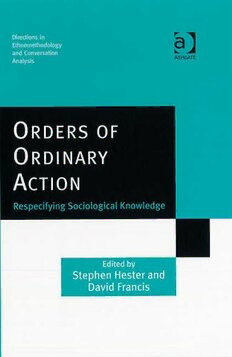
Orders of Ordinary Action: Respecifying Sociological Knowledge PDF
244 Pages·2007·2.405 MB·English
Most books are stored in the elastic cloud where traffic is expensive. For this reason, we have a limit on daily download.
Preview Orders of Ordinary Action: Respecifying Sociological Knowledge
Description:
The theme of this book is how ethnomethodology provides for an 'alternate' sociology by respecifying sociological phenomena as locally accomplished members' activities. This theme is explained in the first two chapters, which comprise an introduction by the editors and a seminal statement of ethnomethodology's analytic stance by its founder, Harold Garfinkel. In his chapter, Garfinkel sets out his conception of the 'corpus status' of ethnomethodological studies as an alternative mode of inquiry into the organization of social life. The remainder of the book comprises original research studies by leading scholars in the field. These chapters are organized into two parts. In the first, the focus is on studies of practical action and organisation. In the second, the emphasis is on studies of practical reasoning and situated logic in various settings. By organizing the book in this way, the collection demonstrates the relevance of ethnomethodological investigations to established topics and issues and indicates the contribution that ethnomethodology can make to the understanding of human action in any and all social contexts. Both individually and collectively, these contributions illustrate how taking an ethnomethodological approach opens up for investigation phenomena that are taken for granted in conventional sociological theorizing.
See more
The list of books you might like
Most books are stored in the elastic cloud where traffic is expensive. For this reason, we have a limit on daily download.
